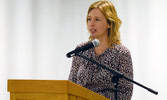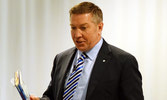Kennedy aims to change culture around abuse - April 4, 2019
BY SHAWN LOUGHLIN
Sheldon Kennedy, an internationally-recognized advocate of violence and abuse awareness programs, was able to reach dozens of people on Friday thanks to a Rural Response for Healthy Children event in Goderich.
Kennedy was the keynote speaker at the event, which was held at the Knights of Columbus Centre in Goderich, addressing his trailblazing response to being sexually abused at a young age and his life’s path as a voice for others experiencing abuse.
The event, dubbed “Safe Places Huron with Sheldon Kennedy”, began with Kennedy’s address and a lengthy question-and-answer period, followed by roundtable conversations about the Safe Places initiative. It attracted the likes of Huron-Bruce MPP and Minister of Education Lisa Thompson, Huron-Bruce MP Ben Lobb, Huron federal Liberal hopeful Allan Thompson and Huron County Warden Jim Ginn, as well as dozens more from local organizations, including over 40 high school students from Goderich.
After a brief introduction, Kennedy launched into his own story as a young hockey player of promise from a small town of just 150. As a young prospect, it was then that famed hockey coach Graham James took interest in him, bringing him to a hockey tournament in Winnipeg, which was when he first abused Kennedy. James has since been convicted of abusing other young hockey players and is still in legal peril after additional allegations against him surfaced in 2015.
Kennedy told those in attendance that before James began abusing him, James was very highly regarded in the hockey community, having been named Man of the Year by The Hockey News (that honour was later revoked). He said it was easy to understand why he was seeking James’ approval and why he wanted to connect with him.
However, coming back from Winnipeg, he says he was changed forever, coming back like a zombie after the abuse.
It was after that initial abuse, Kennedy said, that he began to act out, which is a pattern among those who have been abused, sexually or otherwise.
He began to drink and get in trouble with the law, he said, and that is where the awareness and shift in conversation needs to begin. He said that the question needs to change from “what’s wrong with you?” to “what happened to you?”
Kennedy is viewed as a pioneer in terms of blowing the whistle on sexual abuse. When he pointed the finger at James for years of sexual abuse, he was one of the first to do so and has since been cited as a trailblazer for his bravery and courage.
In the years since, Kennedy has been employed as an expert witness in a number of hearings and has often been interviewed or consulted when large cases of sexual abuse are being adjudicated in the legal system.
Kennedy looked to his own track record of being the child on the wrong path, acting out and breaking the law, saying that often these children have experienced trauma in their past, which is what has then caused them to act out and break the law.
When Kennedy founded Respect Group Inc., he said he was very surprised to find that many of the law enforcement and aid agencies were not communicating with one another to solve a common problem. He said that, to him, sharing resources and working together seemed like the natural course of action, but it just wasn’t happening and people simply weren’t connecting the dots to the cause and effect of sexual abuse and the behaviour many survivors would exhibit in the years following.
He compared it to fielding a hockey team of players who have never met, not teaching them anything and then sending them out on the ice with the expectation that they would win games. He also suggested it was like trying to repair a broken leg by cutting an X-ray in four pieces and handing those pieces to four different doctors. It’s impossible to get anywhere, he said, unless everyone has the same information and is working towards achieving the same goal.
Since founding Respect Group Inc., Kennedy says the organization has helped to bridge those gaps in western Canada and has served as a model for other agencies across Canada and beyond, looking to bring several different agencies on board and working towards achieving the same goal.
The statistics, he said, are shocking. He shared some with those in attendance, saying that according to his group’s records, 95 per cent of abuse survivors know their abuser, while 45 per cent of abuse happens within the survivor’s own home.
He said that while making people aware of the warning signs of bullying and abuse is crucial, it’s also important to empower everyone to recognize bullying and stop it before it can grow.
He also reminded people, however, that the vast majority of abuse goes unreported. So to look at his organization’s statistics provides an incomplete picture and those numbers need to be multiplied several times over, which is a scary thought.
Selena Hazlitt, executive director for Rural Response for Healthy Children, said that she felt Kennedy connected greatly with those in attendance in Goderich. She also said that seeing Thompson, Lobb and Ginn in the audience told her that the organization was discussing something that was not only important to her, but to them as well.
The most important thing Kennedy discussed, Hazlitt said in an interview with The Citizen after the event, is to equip the community and teach them how to respond when the situation arises. Like Kennedy said in his address, sexual abuse is an uncomfortable issue; it’s uncomfortable when it happens and it’s uncomfortable to talk about after the fact. That’s why the community needs to empower volunteers and designate safe places to ensure that survivors know there is help and resources waiting for them when they come forward.
Rural Response for Healthy Children just began its new fiscal year, rolling out the next year’s worth of programming. For a full schedule and more information on the organization, visit its website at www.rrhc.on.ca.



